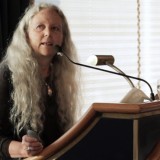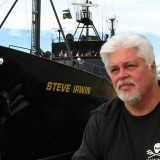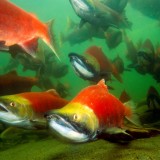This article appeared originally on the blog of Captain Paul Watson’s Sea Shepherd Conservation Society.
I remain a prisoner in Germany in a case that has become highly unusual, controversial and international.
On May 13th, 2012, I was arrested at Frankfurt airport in Germany because in October 2011, Costa Rica issued an order for my arrest and extradition for an incident that had taken place in 2002.
That incident involved a confrontation between the Sea Shepherd crew and a poaching vessel that we caught finning sharks in Guatemalan waters. We were given permission to intervene to stop the killing of the sharks by the Guatemalan government. No one was injured and there was no property damage but the Costa Rican poachers accused us of endangering their lives.
And 10 years later I found myself arrested in Germany because of this complaint.
Even more strange is that I had traveled extensively between October 2011 and the present, including trips to Europe and had not been arrested. That was because Interpol had dismissed the extradition warrant as being politically motivated. But for reasons unexplained Germany had not dismissed the warrant despite Interpol `s dismissal.
Germany does not have an extradition treaty with Costa Rica but insists they can extradite to Costa Rica if they decide to so.
Is it a coincidence that Japan launched a civil lawsuit against Sea Shepherd in October 2011 when they were granted $30 million U.S. dollars from the Tsunami Earthquake Relief Fund to be used to protect the Japanese whaling fleet from the Sea Shepherd Conservation Society?
Is it a coincidence that Costa Rican President Chinchilla paid a visit to the Prime Minister of Japan in December 2011?
It is a coincidence that President Chinchilla visited Germany ten days after my arrest because she had no way of knowing I would be arrested and my arrest actually caused her problems and distractions she would have rather not had during her visit to Germany.
It was unusual that I was granted bail in a country that does not provide for the possibility of a bond for prisoners held for extradition.
It was unusual that the Costa Rican Foreign Minister requested a meeting with me during his visit to Germany with the President of Costa Rica.
It was unusual that the President of Costa Rica publicly made a statement that I would get a fair trial in Costa Rica. This statement alone implies that there were reasons to suspect that I would not get a fair trial in Costa Rica.
I believe that if given the opportunity to present our documentation, evidence and witnesses in a Costa Rican court that I would be found not guilty.
I told the Costa Rican Foreign Minster that I would return to Costa Rica voluntarily with my defense team if a trial date was set but I felt it was unfair to imprison me in Costa Rica until a trial date is set because that could take months or even years.
I also told the Costa Rican Foreign Minister that Sea Shepherd wants to work with Costa Rica to protect sharks and to protect the Cocos Island National Park Marine Reserve.
I don’t think that Germany or Costa Rica anticipated the international response of support for my position. Dozens of demonstrations around the world before German Embassies, 400 demonstrators in Berlin to greet the Costa Rican President, a statement from the President of the Brazilian Senate calling for my release, statements from celebrities worldwide, support from the European Parliament, threats to boycott tourism to Costa Rica.
Our legal team has filed a motion to dismiss the charges based on errors in the warrant.
If the motion is not granted, Costa Rica has 90 days to provide the file to the German authorities requesting extradition.
So I could be free to leave Germany in a few days, a few weeks or three months or if we lose the case then I would be forcefully extradited to Costa Rica OR if I lose the case, the German government can intervene politically to prevent the extradition.
All and all it seems like a great deal of effort to go to because a couple of shark finning fishermen who were not hurt nor had their property damaged had made a complaint.
Meanwhile nothing ever happened to the Captain of the Shonan Maru 2 for destroying the 1.5 million dollar Ady Gil and almost killing 8 people and injuring one of them. There is no extradition order for him, no arrest warrant – nothing!
Why?
Because the law is there to protect those who profit from exploiting the oceans and not for those who work to protect the oceans.
Whatever happens, there is one undeniably positive outcome of this entire incident and that is that worldwide attention is being focused on shark finning and the horrific massacre of tens of millions of sharks every year and for what?
For a bowl of soup!
Captain Paul Watson is the founder of Sea Shepherd Conservations Society.





